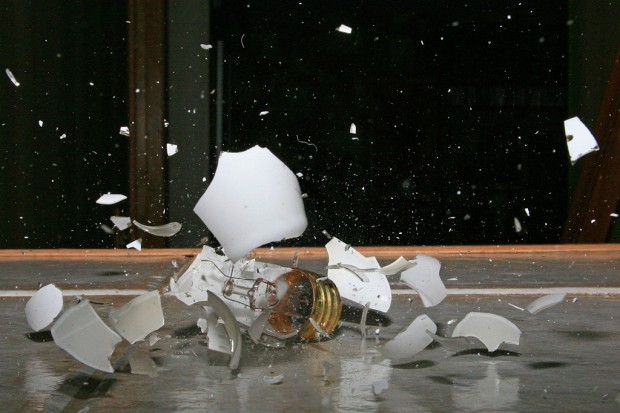
We asked Kelly Nestruck if he would provide a picture of himself - he said he would prefer to be represented by this picture of Gilles Duceppe eating a whole fish.
by Michael Wheeler
Torontonians like to think the role of a theatre critic is to hand out stars and write the occasional preview puff piece – try telling that to Globe and Mail critic Kelly Nestruck.
The Windy City is blowing Toronto away
- Written by Kelly Nestruck
- Directed at anyone who wants Toronto performing arts to be awesome.
- Starring the civic and performing arts community leaders of Chicago and Toronto.
- In The Globe and Mail newspaper.
- Three-and-a-half stars out of four.
There is a spectre haunting Toronto – the spectre of a World Class Performing Arts City. All three levels of government have entered into a holy alliance to exorcise this spectre: through funding Toronto arts municipally less per-capita than any major North American city, through inside deals made by provincial government mandarins, and federal prizes created through the use of falsified documents.
Kelly Nestruck’s latest piece in The Globe and Mail can be read as a critique on all of these decisions and a simultaneous wake up call to the city’s cultural leaders that it is an outdated notion that Toronto is “on top of the world” as far as the performing arts are concerned. The argument is presented through a comparison of how Toronto and Chicago stack up against each other in four the four Cs: Civic leadership, Collegiality, Comprehensive Criticism, and Confidence.
In each instance Chicago comes out on top – for the most part because the Chicago community actually views themselves as, and operates as, a community. They understand fundamentally that all parts of the performing arts are part of an ecosystem – from the recent theatre school grads putting up a storefront show to a Broadway-bound musical. As such, Chicago has become not just a stepping-stone to greater success in NYC, but a place TO BE a world-leading theatre artist or patron. Period. If a show transfers to New York – great for the producers – but the city continues to be a great town for theatre regardless.
Embedded in the article are a number of suggestions I fear will be lost in the simplistic debate about “Which city is better?” so I list them below. Perhaps we will revisit them in several years time to see if any progress has been made in the revitalization of Toronto’s performing arts:
- Stop using those ridiculous flags along the roadways imploring Torontonians to “Live With Culture”. WTF does that mean? How is that at all helpful? It’s time to divide them up amongst the ACTUAL cultural institutions in the city.
- Start investing arts infrastructure in the city. Not just big name theatres, but smaller spaces and rehearsal spaces too. Ten years after Mayor Daly began investing in Chicago’s performing arts, not only are they booming, the city estimates it has already made “far more” in increased revenue than the original investment. It’s smart money.
- Some of the major Canadian theatres (okay CanStage and SoulPepper) oughta stop having opening nights on the same evening. This is probably more frustrating to a critic for a national newspaper than anyone else, but he’s right that it is an illustration of a grander chasm regarding the responsibility the powers-that-be feel towards being constructive community members.
- The Toronto Star, The Globe and Mail and The National Post need to start reviewing a much wider variety of shows – including non-Equity ones. It is ridiculous that membership in a professional association should impact whether or not a production is great art. This rule does not exist in Chicago, NYC or London and is the simplest and easiest way to begin the inevitable indie theatre renaissance that our community desperately needs. The thing about ecosystems is that you can’t pick and chose which parts of them to report on.
- Confidence: We will only be taken seriously, when its clear we believe in ourselves. For real.
Where Nestruck goes astray in his analysis is neglecting to mention the serious ethos of collegiality that still exists amongst the emerging artists in Toronto’s theatre scene despite all these obstacles. I am constantly blown away by the mutual support and willingness to help each other that exists in my generation of artists and I actually think it is our greatest strength moving forwards. Likewise, citing TAPA as ineffective seems particularly egregious as it has 23 active committees all formed by volunteer members from the performing arts community, was the birthplace of The Indie Caucus, distributes a bi-monthly theatre guide throughout the city, runs The Doras, TO Tix, and a variety of programs that make the performing arts more accessible to youth and at-risk communities. I mean, what else do you want from an arts service organization?
On Sunday evening, The Canadian Theatre Critics of Canada hosted a panel discussion with The Tarragon Theatre titled, Reviewing on the Internet: The Rebirth of Theatre Criticism? Because I was watching the Superbowl (in Vancouver) I can’t tell you what happened there, but I can tell you this: The internet made Kelly Nestruck the theatre critic for Canada’s most influential newspaper through his online work for Torontoist, The National Post and The Guardian. And now we’re having this conversation here and in The Globe and Mail – so I’m going to go ahead and give that rhetorical question a “yes”. And the reason it’s different now is we’re talking about what is actually going on, what needs to be done to make it better, and not a fictional reality that serves established old-guard interests.
]]>
Image by Laszlo under a Creative Commons 2.0 license
by Michael Wheeler
Wow, Theatre Skam wasn’t joking when they predicted back in March that the government cuts to culture would cause A Total Eclipse of The Arts.
The recent BC budget called for a 90% cut to arts and culture, while most industries averaged out at 7% cutbacks: From $47.8 million in 2008/09 to $3.75 million in 2010/11. It is not hyperbolic to refer to this as utterly devastating. Within a year, many organizations will cease to exist. Looming over this “arts-pocalypse” as Globe and Mail critic Kelly Nestruck first referred to it on Twitter, is the Cultural Olympiad occuring in BC as part of the upcoming Olympic Winter Games.
The dilemna seems clear: The lead up to the games is the only time cultural leaders will have any leverage with the government. They, along with some of the best talent from across the country, are required to entertain the whole gosh-darn planet in a few of months. Afterwards it seems they will be expendable and dispensable, which is a thesis heavily supported by the provincial budget.
But who wants to mess up the Olympics? Many artists have worked their whole lives to arrive on a stage as bright as this. Almost everyone in the arts knows someone who has an amazing opportunity they wouldn’t otherwise have due to the Cultural Olympiad.
How to handle this situation will certainly require a sophisticated response from BC artists. It’s a mean-spirited position to put an entire industry and community in. There has been quite a bit of action on the Facebook Group: Organizing against Campbell’s cuts to the arts. Within days it has skyroceted to almost 2500 members and looks to be a central hub for information on this topic.
Are we really going to have one of those ridiculous national “Does art matter?” conversations again? What do you think should be done? How can the rest of Canadian artists support those in BC? One day everything on this website will be about art and how much fun it is to make it!
]]> Finding a way to project this image of Department of Culture’s recent Senate appointments was what started the whole (Wrecking) ball rolling for me.
Finding a way to project this image of Department of Culture’s recent Senate appointments was what started the whole (Wrecking) ball rolling for me.This was hilarious for many reasons. These included:
- It is possible that some of the alcohol from the Stranger closing night party was still in my system when I arrived at Theatre Passe Muraille on Monday morning.
- I had no real knowledge about how digital projectors worked, but would be running one.
- I had never used Powerpoint before, which all of the images I was responsible for would be stored in and manipulated by – on one of two laptops. I would be unable to determine which one until I arrived.
- As I have stated previously, I believe The Wrecking Ball to be the most exciting thing going on in Canadian theatre right now, and I felt a heavy bias towards not fucking one up.
- Things got more ridiculous when I ended up writing a report on this experience for The Globe and Mail, which critic J. Kelly Nestruck duly posted on their theatre blog, Nestruck on Theatre.